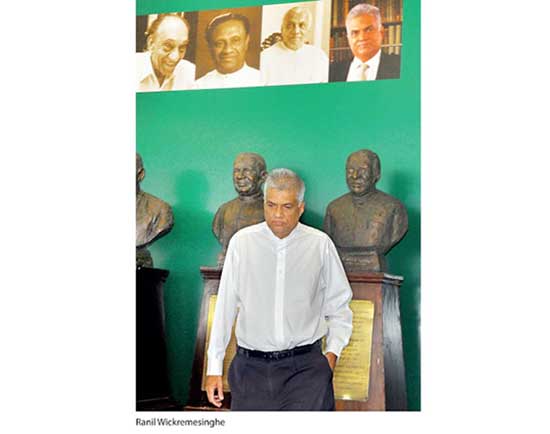Opinion
Ranil and the UNP’s continuing nemises

The majesty of our elephant has regretfully fallen to the state of scavenging for food at roadside garbage dumps. A fate so fallen on the once mighty United National Party, under its unmoving bungling mahout for 26 long years. The leadership of the UNP fell into the lap of Ranil Wickremesinghe with the tragic obliteration of the powerful frontline party leadership. If JR. Jayewardene resurrected the mainly bourgeois political party, once sarcastically referred to as Uncle. Nephew Party, R. Premadasa the grass root politician he was, touching the hearts of the common man, strengthened the support base of the party to be the strongest single political party in the country. Assassinations of R. Premadasa and Gamini Dissanayake resulted in a second liner in leadership, Ranil Wickremasinghe (RW), becoming Prime Minister, in May 1993, appointed by DB. Wijetunga.
His lordly attitude and level of commitment for the concerns of the rank and file of the party was apparent from the beginning. The UNP, with one seat less, to form the Government, at the 1994 General Elections, RW, the incumbent Prime Minister, to the astonishment of the party seniors and members, throws in the towel, leaving Temple Trees, in haste, with bag and baggage, making way for childhood family friend Chandrika Kumaratunga to form a Government. This paved the way for her to become President. RW never showed to be a proactive leader who led from the front to win the hearts of the people. Never a marketable product. As the leader, he was more a stopgap alternative of the people, in times of adversity, and used as a slap to those whose governance was going at a tangent. This happened to Chandrika and Mahinda. As proved, RW could never retain power entrusted because he could not govern. His road map for power was opportunistic basking in the light of others.
During the six-year reign of Chandrika B.Kumaratunga, beginning 1994, the economic development of the country plunged to below zero, and the war against LTTE took a disastrous turn, leaving the country in deep turmoil. In utter frustration, people had no other option but elected the UNP, under RW, in 2001. RW in his pessimism, believed that the LTTE could never be defeated. People were yearning for peace, but not at any cost. An honourable deal, without division of the country, upholding national sovereignty. With a biased Norway mediation, which appeased pro-LTTE Western Powers, RW concluded a Ceasefire Agreement (CFA), which was considered one sided, favouring only the LTTE, a complete give away, demoralizing the spirit of the Armed Forces, with hands tied, confined to barracks, whilst LTTE cadres were roaming free, violating the terms of Agreement. RW came to be despised by the Sinhalese, home and abroad, and nationalistic movements, for his weakness to the situation. If some long term benefits were generated by the Agreement, it was wholly unintentional. Paralalley RW’s arrogance of governance and hard economic measures, to better the economy, did go beyond the already unbearable limits. Those who suffered most were the UNPers, whose expectations of jobs and compensation for victimization, under CBK rule, was completely ignored, a hallmark of RW administration.
The threat of CBK capitalizing on the situation was ominously clear and imminent, which RW, in his own wisdom, chose to ignore, even grounding moves to impeach her in Parliament. CKB struck back by taking back two important Ministries and abruptly dissolved Parliament, in April 2004. The UNP reeled and, under RW, lost the election, destined to be in the opposition till 2015. Party defeat did not matter much for RW, because he enjoyed his position and perks as Leader of the Opposition, thanks to evergreen Colombo voters. He switched to the safe base of Colombo, from his original home electorate of Biyagama, where he last contested in 1977. If he remained, he would have been soundly rejected at all subsequent elections.
In the aftermath of RW’s abortive bid for Presidency, in 2005, there was a strong call for change of party leadership in favour of Karu Jayasuriya, but with RW artfully dodging the issue, Karu and 18 stalwarts of the UNP chose to leave the Party and join Mahinda R. Karu came back but others, today, are the frontliners in the Rajapakse Camp, carrying his party forward. Most of them are now Cabinet Ministers. RW’s artful dodging history was revisited with Sajith Premadasa, and seniors, leaving the party, to oppose RW.
The UNP had to wait till August 2015 to taste power, under similar circumstances, that pervaded in 2001. RW should have had the Parliament dissolved immediately, after Sirisena’s Presidential victory, in January 2015, which would have maximized a UNP victory in a new parliament and a wholly UNP Cabinet of Ministers. Instead RW, with a minority in Parliament, had a thirst for instant power, crowning himself Prime Minister of a Yahapalana coalition Government, with Sirisena, till August 2015, which he took forward to the gradual and steady destruction of the UNP, till 2020. He and some of his political sidekicks were booted out by the UNP City of Colombo. RW did lead to reduce the Great Party to a little over 2% of votes received nationally, with no elected representation in the new Parliament. RW ployed with the naïve belief that UNPers always loved to vote for the Elephant than the candidate. He did not grasp the hard truth that people want him and his cahoots out. RW still seems to believe he is the UNP and will certainly nominate himself to the allocated a Parliament seat, come next week. Profoundly assisted by his cabal, he has made the symbol Elephant a forgotten trade mark and the UNP a forgotten brand.
ADOLF SILVA